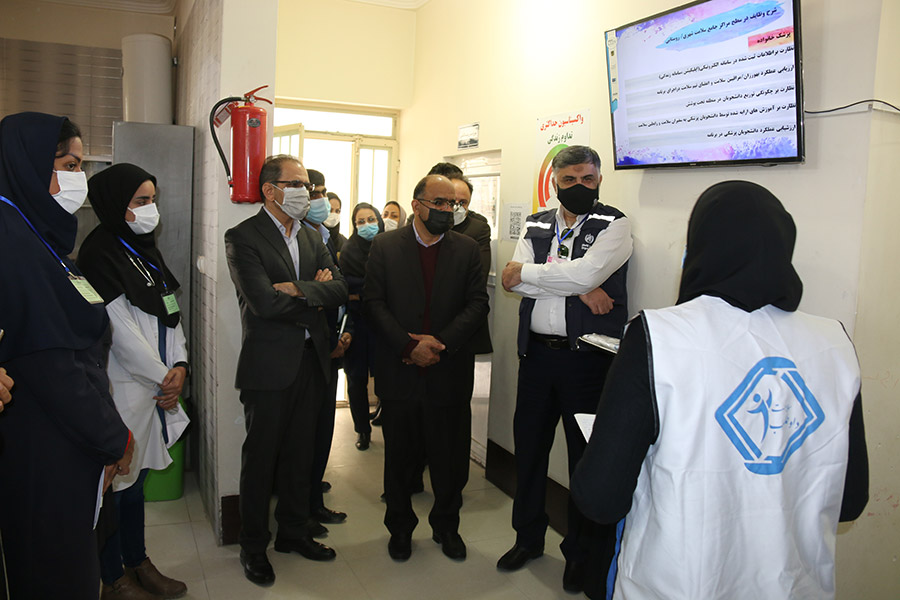 WHO Representative and Head of Mission Dr Syed Jaffar Hussain is briefed at Ammar Yaser Health Center and Delivery Facility in Shirabad Neighbourhood of Zahedan. Photo: Zahedan University of Medical Sciences
WHO Representative and Head of Mission Dr Syed Jaffar Hussain is briefed at Ammar Yaser Health Center and Delivery Facility in Shirabad Neighbourhood of Zahedan. Photo: Zahedan University of Medical Sciences
Monday, 14 February 2022 – In a recent two-day visit to Zahedan University of Medical Sciences (UMS) in the southern and border province of Sistan and Baluchestan, Islamic Republic of Iran, World Health Organization (WHO) Representative and Head of Mission Dr Syed Jaffar Hussain met with local health authorities to review the efforts made in scaling up health services in the province and to explore avenues of collaboration in promoting national plans in the area of health and health promotion in the area.
The visit on February 1–2 mainly aimed to look at the collective progress made over the past years by universities of medical sciences and relevant agencies in the province with regards to health care services, including those concerning Afghan refugees and other foreign nationals in the area.
The visit encompassed a meeting headed by Iranian parliament’s Health Commission Head, Dr Hossein Shahriyari, with Dr Hussain, which reviewed the health priorities of Sistan and Baluchestan and discussed ways that WHO can support ongoing or planned efforts in the field. The high-level session was attended by Dr Hashemi Shahri, Chancellor of Zahedan UMS and his deputy for Public Health Affairs Dr Seyed Mehdi Tabatabaei, as well as Dr Kamran Kordi, Chancellor of Iranshahr UMS, Dr Mahdi Afshari, Deputy Chancellor of Zabol UMS, Dr Mansour Saeedi, Director General of the provincial Bureau for Aliens and Foreign Immigrants’ Affairs, and Dr Mansour Ranjbar, Lead for Noncommunicable Diseases and Mental Health at the WHO country office.
“There has been remarkable advancement in improvement of health indicators in the province over the past few decades, but the continuation of this positive trend so that it meets the national average requires further scaled up support and effort,” said Dr Hussain during the meeting.
Dr Shahriyari took note of milestones achieved in Sistsan and Baluchestan, including elimination of local transmission of polio, measles and rubella, and acknowledged WHO’s continued support over the years.
“It is natural that decades of war and insecurity in the neighbouring country of Afghanistan have also affected health issues, and now one of our health system’s serious concerns, especially in the border regions, is tuberculosis and multidrug-resistant tuberculosis,” he added.
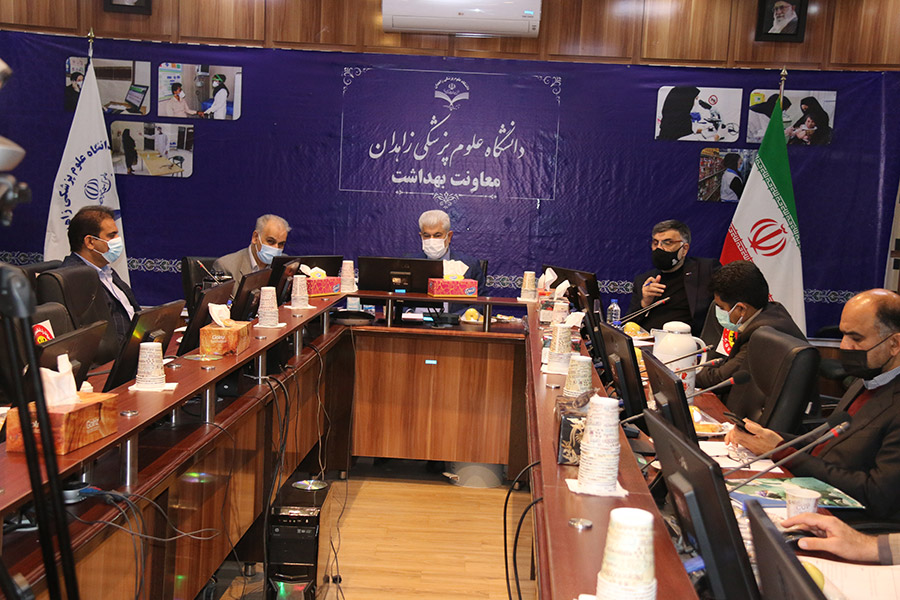 Briefing Session chaired by Iranian parliament’s Health Commission Head Dr Hossein Shahriyari (middle) and attended by Dr Syed Jaffar Hussain (third right). Photo: Zahedan University of Medical Sciences
Briefing Session chaired by Iranian parliament’s Health Commission Head Dr Hossein Shahriyari (middle) and attended by Dr Syed Jaffar Hussain (third right). Photo: Zahedan University of Medical Sciences
While thanking the Islamic Republic of Iran and the national health system, Dr Hussain expressed WHO’s readiness to provide continued international support from available resources to the provincial health sector. Afghan immigrants have been benefiting from various free public health services in the country, including Sistan and Baluchestan, for many years.
Providing assistance to Sistan and Baluchestan in strengthening the response to COVID-19, furthering cooperation with the neighbouring countries of Afghanistan and Pakistan in tackling health issues, and supporting health and medical infrastructure in the province in cooperation with Health Ministry and other UN Agencies were among other topics discussed during the visit.
As the leading agency within the UN-led working group on health in the country, WHO will use all potential opportunities to support the province in partnership with its UN partners, including the United Nations Children's Fund (UNICEF), United Nations Population Fund (UNFPA), World Food Programme (WFP) and other collaborators, Dr Jaffar underlined.
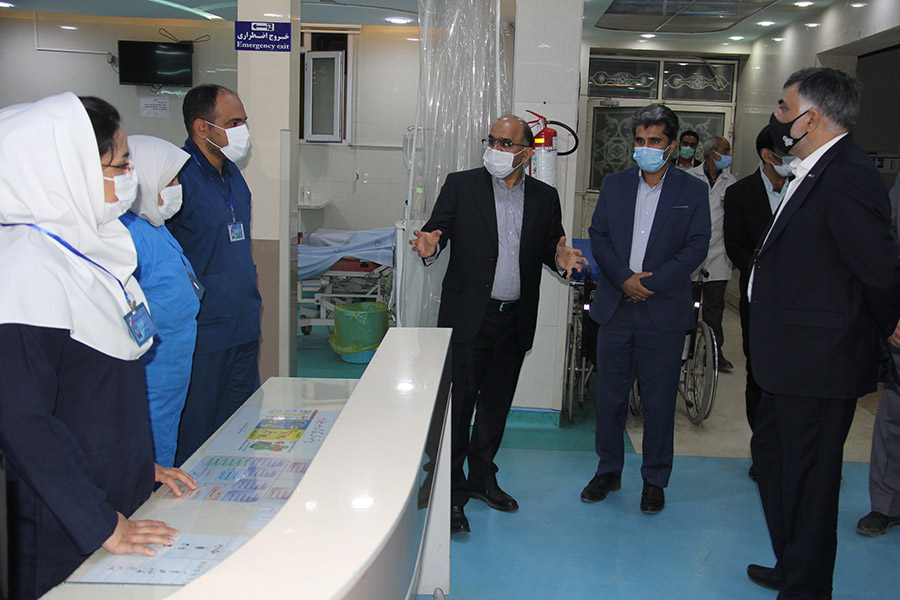 WHO Representative and Head of Mission Dr Syed Jaffar Hussain is briefed at Khatam Al Anbia Hospital. Photo: Zahedan University of Medical Sciences
WHO Representative and Head of Mission Dr Syed Jaffar Hussain is briefed at Khatam Al Anbia Hospital. Photo: Zahedan University of Medical Sciences
The meeting also discussed the possibility of Zahedan UMS establishing a rapid response emergency stock warehouse in the province in cooperation with WHO.
“Such a centre will be able to provide pharmaceuticals, equipment, diagnostic kits and the like and keep them in proper storage conditions in order to be quickly distributed in the area when needed,” said Dr Hussain during the meeting. A similar centre is currently operating in Dubai with the support of WHO and had demonstrated success in the rapid distribution of international donations to approximately 100 countries worldwide, he added.
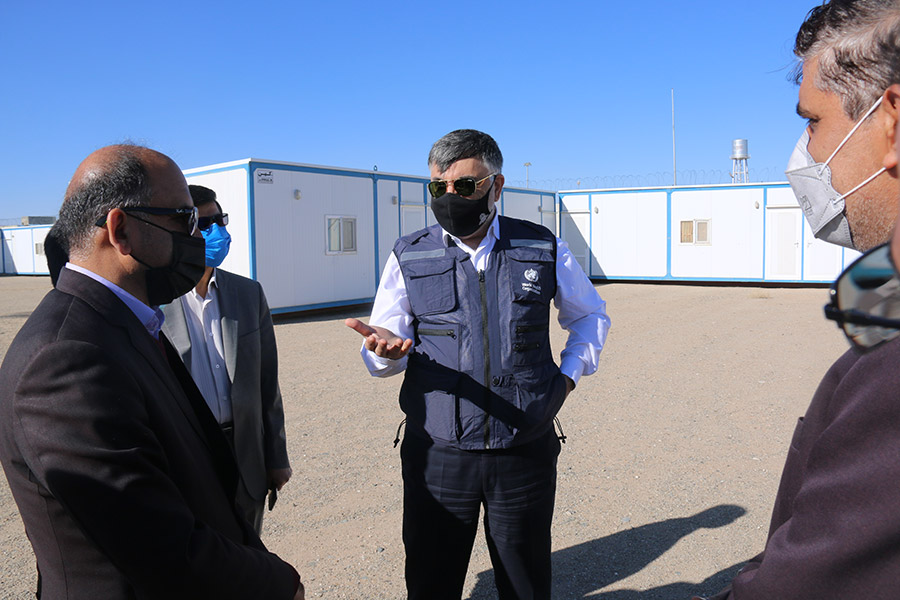 WHO Representative and Head of Mission Dr Syed Jaffar Hussain visits Zahedan Alghadir Refugee Camp. Photo: Zahedan University of Medical Sciences
WHO Representative and Head of Mission Dr Syed Jaffar Hussain visits Zahedan Alghadir Refugee Camp. Photo: Zahedan University of Medical Sciences
The Islamic Republic of Iran is also ramping up national efforts to structure and reinforce surveillance of vector-borne diseases by setting up an insectarium at Zahedan UMS in the province. The insectarium, which was visited by the WHO delegation, is being constructed with the aim to establish a surveillance system with an emphasis on Anopheles (bearing malaria) and Aedes (dengue carriers) mosquitoes as two potentially key disease carriers given the tropical climate of the region. Once completed, it will become the national and regional hub for entomological studies, local authorities predict.
The WHO team’s excursion concluded by visiting the proposed premises for the rapid response emergency stock warehouse, dialysis and intensive care units of Khatam Al Anbia Hospital, Zahedan Alghadir Refugee Camp, Ammar Yaser Health Centre and Delivery Facility (in Shirabad neighbourhood) and Seraj Community-Based Mental Health Clinic.
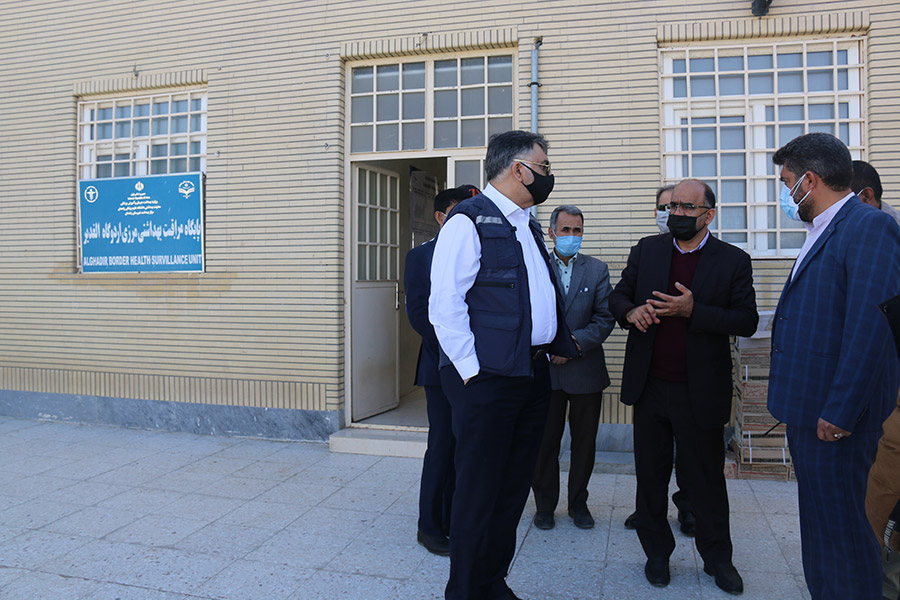 WHO Representative and Head of Mission Dr Syed Jaffar Hussain visits Seraj Community-Based Mental Health Clinic. Photo: Zahedan University of Medical Sciences
WHO Representative and Head of Mission Dr Syed Jaffar Hussain visits Seraj Community-Based Mental Health Clinic. Photo: Zahedan University of Medical Sciences




